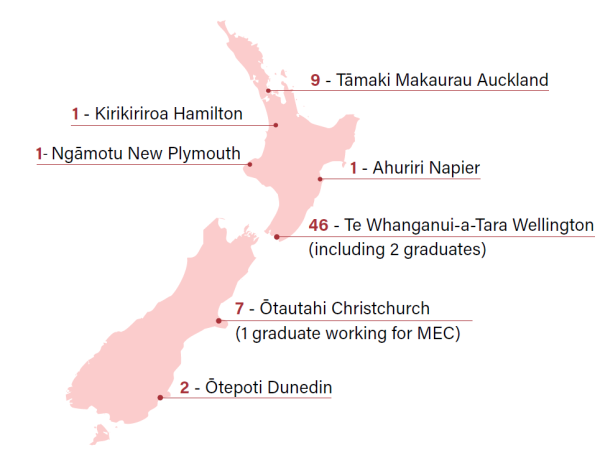On this page
Driven by purpose – the why behind our Ministry
Our journey as a Ministry began in response to the recommendations of the Royal Commission of Inquiry following the tragic terrorist attack on Christchurch mosques in March 2019. We have worked to enhance social cohesion and respond to the evolving needs of our increasingly diverse population.
Since our inception on 1 July 2021, we have embraced our role as the Government’s chief advisor on matters concerning ethnic communities, ethnic diversity, and their meaningful inclusion within our super-diverse society.
In our inaugural year, we focused on setting solid foundations and developed our 2022-2025 strategy.
As we entered our second year, our focus shifted from planning to action, and we began the implementation of our strategy.
We continue reviewing our plans and work programmes, to ensure that they remain responsive to the evolving needs of our ethnic communities and are still valid in the constantly changing national and local contexts.
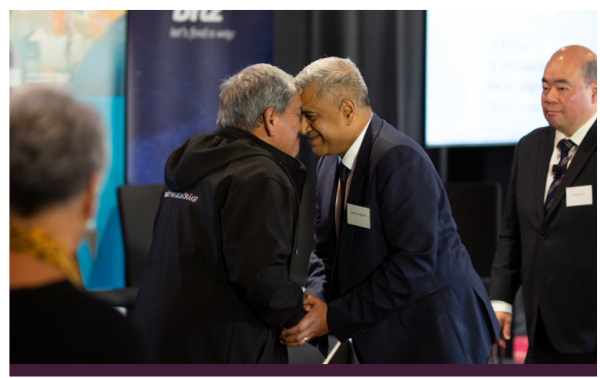
From the whakatuki of the EthnicBiz Forum, Auckland, May 2023
Our values
At the Ministry, we start from within by embracing the values we promote among the ethnic communities we work alongside. They act as guiding principles for our mahi to help us build a genuinely inclusive Aotearoa.
We are also committed to demonstrating our respect for tangata whenua by ensuring an appropriate te ao Māori lens is applied across our mahi. This acknowledgement of our country’s rich cultural heritage and the principles of Te Ao Māori is of utmost importance to both our staff and the ethnic communities we serve.
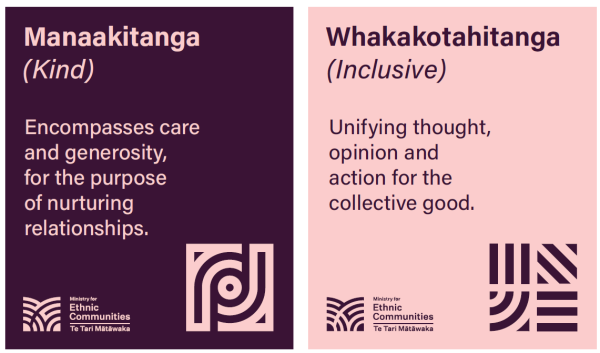
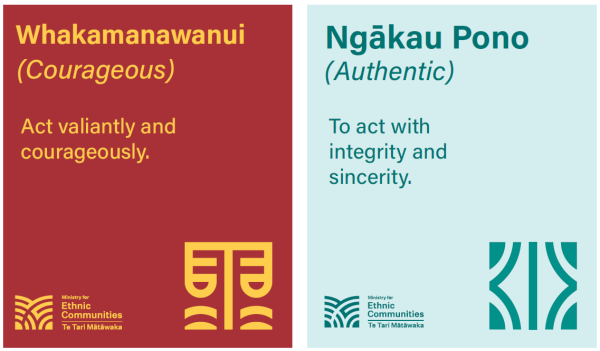
Our people
Promoting cultural competence and embracing diversity in our team
We are a relatively small agency. Our Ministry has a total headcount of 67 individual employees. As some employees work part-time hours, our total full-time equivalent (FTE) staff number is 66.2.
Our staff numbers fluctuate from one year to another due to the number of graduates on our Ethnic Communities Graduate Programme and because we had additional contractors to help us set up the Ministry in our first year.
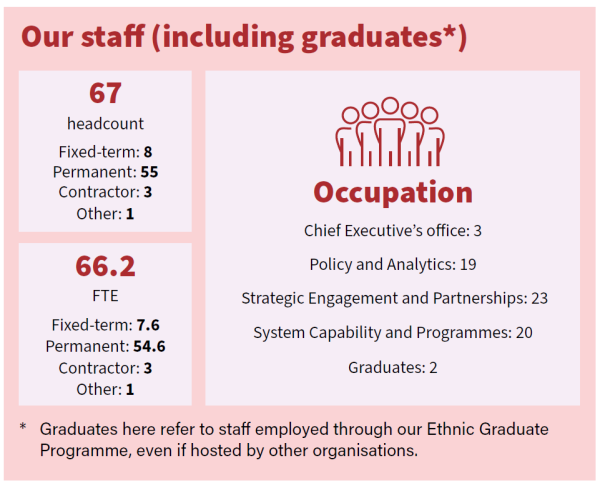
Staff turnover (excluding graduates)
2022/2023: 14.8% (compared to 19.4% in 2021/2022)
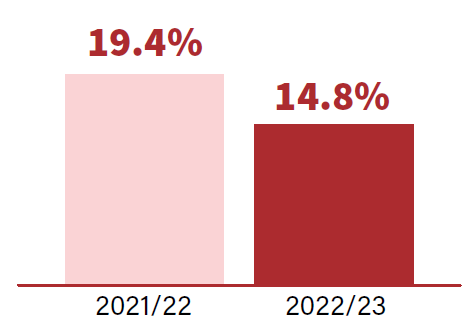
Papa Pounamu, Kia Toipoto and Whāinga Amorangi
Papa Pounamu is a Chief Executive-led, government-wide, Diversity, Equity and Inclusion Programme (DE&I). It has five priority areas: fostering diverse leadership, building inclusive leadership, building cultural competence, addressing bias and supporting employee-led networks.
Papa Pounamu sits alongside other separate, but related, work programmes to strengthen public service capability for Māori-Crown relationships (Whāinga Amorangi) and closing Public Service pay gaps (Kia Toipoto).
The Ministry’s role in supporting DE&I initiatives in the public service is both internal and external:
- Internally, we must ensure that we have initiatives in place to deliver our obligations under Papa Pounamu, Kia Toipoto and Whāinga Amorangi, and build positive and safe workplaces for our kaimahi.
- Externally, given one of the foundational pou is specific to ethnic communities, we ensure that the DE&I work across government includes ethnic communities (as it does Pacific, Māori, disabled, gender and rainbow communities).
To support this work, we provide advice, tools and resources (working with other relevant agencies), to support the public sector with their DE&I initiatives, specifically for intercultural capability and language. The tools and resources we develop are also of value to other workplaces.
Kia Toipoto: Our progress towards a more inclusive workplace
The Ministry has made progress in achieving the milestones outlined in our Kia Toipoto action plan.
We do not have a significant gender pay gap and constantly monitor our recruitment and remuneration processes to ensure this is maintained. We produced regular reports on staff demographics, salaries and pay gaps to monitor this aspect. This data played a crucial role in guiding our Human Resource decisions.
Whāinga Amorangi: Increasing our Māori-Crown capability
The Ministry continued meeting its Whāinga Amorangi obligations and building its ability to engage and partner with Māori more effectively.
Te Arawhiti endorsed our Whāinga Amorangi plan on 30 June 2023, which includes commitments to:
- Te reo Māori
- New Zealand history / Treaty of Waitangi literacy
- Tikanga / kawa (customs / marae protocol).
This year, we have put in place several initiatives to help our kaimahi increase their capability in this space, including:
- Providing learning opportunities covering te reo, tikanga and kawa, te ao Māori concepts, New Zealand history, Te Tiriti, whakawhanaungatanga and racial equity.
- Attendance at the ‘Wall Walk’, an interactive half-day workshop designed to raise collective awareness of key events in the history of New Zealand’s bicultural relations. A large number of our kaimahi attended and advised that the workshop was a great initiative.
Our diverse team
In line with our Ministry’s growth, it is essential to foster cultural competence and deepen our understanding of various ethnic backgrounds. We are a diverse mix of ethnicities, reflecting our role and the communities we support.
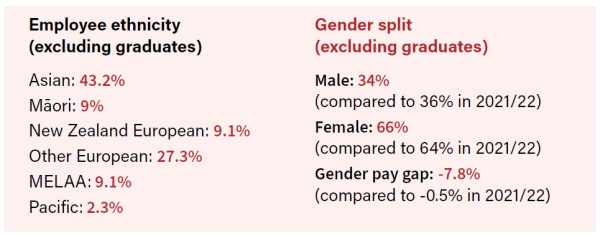 In our Ministry, female employees currently have higher average pay than male employees. This is influenced by our size and the higher proportion of females compared to males, which causes fluctuations in the numbers.
In our Ministry, female employees currently have higher average pay than male employees. This is influenced by our size and the higher proportion of females compared to males, which causes fluctuations in the numbers.
We aim to keep this pay difference as close to zero percent as possible, so it is equitable. We will achieve this by Human Resources providing salary advice to all people leaders for new employees, conducting an annual pay parity process, and regular monitoring of the remuneration ranges and salaries we offer.
Working nationally with a local presence
While acknowledging the diverse needs among local communities, our Ministry strategically supports ethnic communities nationwide. To represent our nation effectively, we recognise the importance of having team members where our ethnic communities live.
We also connect with our ethnic communities in person and via digital channels where we do not have staff based in their regions.
The importance of our local presence was demonstrated during the extreme weather events that hit the North Island at the beginning of 2023.
Regional presence (headcount total)
